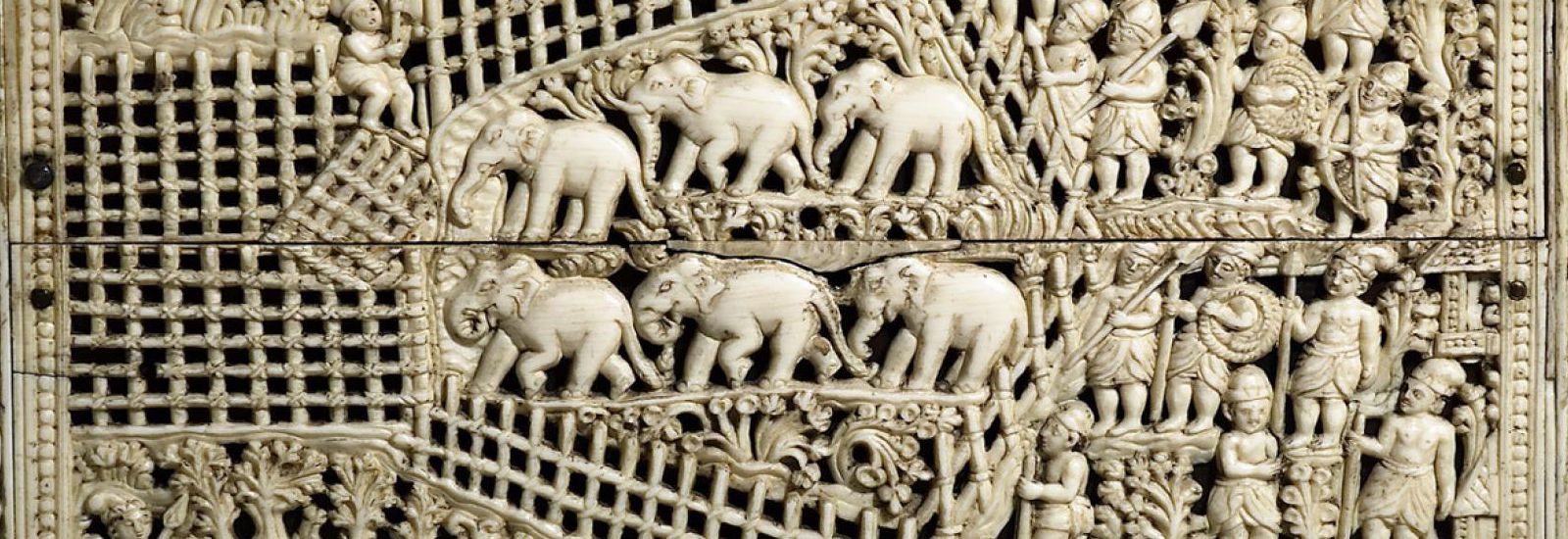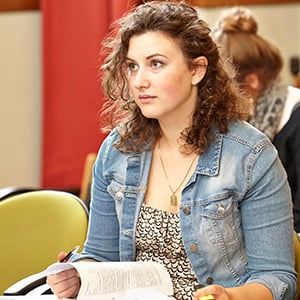
Asian and Middle Eastern Studies
Course overview
UCAS code: See course options
Entrance requirements: AAA
Course duration: 3 or 4 years (BA) (see Structure tab)
Subject requirements
Required subjects: Not applicable
Recommended subjects: Not applicable
Helpful subjects: A language.
Mastering the ability to handwrite is a mandatory core element for Chinese, Japanese and Korean.
Other course requirements
Admissions tests: None
Written Work: Two pieces
Admissions statistics*
Interviewed: 87%
Successful: 32%
Intake: 37
*3-year average 2022-24
Contact
Tel: +44 (0) 1865 278312
Email: [email protected]
Unistats information for this course can be found at the bottom of the page
Please note that there may be no data available if the number of course participants is very small.
Course options
About the course
The Faculty of Asian and Middle Eastern Studies is unique for its focus on introducing students to civilisations that are different from the Western ones upon which the curriculum in most British schools and colleges is based.
The various courses offered by the Faculty present both the major traditions and cultural trends of the regions studied and, in most cases, their modern developments. All courses include a combination of linguistic, literary, historic and cultural studies. There is a wide range of options in fields such as art and archaeology, history, literature, philosophy, religion and modern social studies.
Asian and Middle Eastern Studies has a long history in Oxford. The Bodleian and other libraries possess extensive collections. These include the Nizami Ganjavi Library, the KB Chen China Centre Library and the Bodleian Japanese Library which contain significant collections in their respective fields.
Around the corner from the Faculty building on Pusey Lane is the Ashmolean Museum, which houses superb collections relevant to Asian and Middle Eastern Studies. Nearby are also the Leopold Muller Memorial Library at the Clarendon Institute for Hebrew and Jewish Studies material, and the Bodleian Art, Archaeology and Ancient World Library. The Bodleian Art, Archaeology and Ancient World Library contains the renowned Griffith Institute Archive, one of the finest collections in the world for the study of ancient Egypt and the Ancient Near East.
Work placements/international opportunities
Most courses offer the opportunity to spend time in the region being studied. For example, students of Arabic spend a year in an Arabic-speaking country; students of Turkish in Turkey; students of Chinese in China or Taiwan; students of Japanese in Japan; students of Persian in Iran, Tajikistan and/or Armenia.
For Persian, the Faculty decides each year whether it is advisable for its students to spend their year abroad in Iran. In years when Iran is not possible, they study in Tajikistan and/or Armenia instead.
In certain circumstances, for example due to visa difficulties or because the health needs of students cannot be met, it may be necessary to make adjustments to a course’s requirements for international study. Students who consider that they may be affected are asked to contact their department for advice.
 |  |  |
'I chose Oxford because apart from just learning the language, the [BA Arabic] course gives a solid introduction to many different areas relating to the Middle East, before moving on to focus on particular areas in more depth and becoming really flexible, allowing me to explore my interests. I am looking forward to being able to read literature in Arabic rather than having to study it in translation.' Will | 'Apart from Akkadian language classes and my history and civilisation lectures, which I love, the department in general is so lovely. It's a really close knit community and there's often events going on to get everyone together, lecturers and students alike.' Hannah | 'Most people think of Egyptology and Assyriology as really hermetic subjects, but they involve everything from linguistics and scientific archaeology to literary theory and comparative religion. They just use ancient Egypt and Mesopotamia as contexts for applying and evaluating much broader streams of academic inquiry. And that's great because while you get to pursue your specific interests in the field, you also dip into a bit of everything else - it's not a subject one gets bored of!' Jordan |
Unistats information
Discover Uni course data provides applicants with Unistats statistics about undergraduate life at Oxford for a particular undergraduate course.
Visit the Studying at Oxford section of this page for a more general insight into what studying here is likely to be like.
Please select 'see course data' on the following course options to view the full Unistats data for each.
Please note that there may be no data available if the number of course participants is very small.
A typical week
Your time will be divided between lectures, tutorials (up to three students and a tutor) and language classes that will develop your writing, speaking - when relevant - and comprehension skills. The rest of your time will be dedicated to independent study, working on regular assignments in reading, writing and translation.
Seminar and language class sizes may vary depending on the options you choose or the language you are studying, but there would usually be no more than around 10 students and often fewer, while lectures are normally around 15-25 students.
Most tutorials, classes, and lectures are delivered by staff who are also tutors in their subject. Many are world-leading experts with years of experience in teaching and research. Some teaching may also be delivered by postgraduate students who are usually studying at doctorate level.
Visit our Academic Year page to find out more about how our teaching year is structured.
Course structure
The options listed in this section are only illustrative of what is available. A full list of current options is available on the Asian and Middle Eastern Studies website.
Arabic (T601), Persian (T613), Turkish (T600)
Year 1 | Year 2 | Years 3 and 4 | |
|---|---|---|---|
Courses
| CoursesYear abroad: approved course of language instruction | Courses
| |
AssessmentFirst University examinations after term 3: three written papers; an oral exam (Arabic only) | AssessmentFinal University examinations at the end of Year 4: oral exam and eight or nine written papers (one of which must be a dissertation) | ||
Assyriology (Q401), Egyptology (Q400)
For students starting Assyriology (Ancient Near Eastern Studies) in 2025 or thereafter, please note that the degree title for course Q401 has changed from BA in Egyptology and Ancient Near Eastern Studies to BA in Assyriology. In the new structure, the Egyptology course will lead to a BA in Egyptology (Q400), and the Ancient Near Eastern Studies course will lead to a BA in Assyriology (Q401).
The course content and options will remain the same.
Year 1 | Year 2 | Year 3 |
|---|---|---|
Courses
| Courses
| Courses
|
AssessmentFirst University examinations: four written papers | AssessmentFinal University examinations: ten units |
Chinese (T101)
Year 1 | Year 2 | Years 3 and 4 |
|---|---|---|
Courses
| Courses
| Courses
|
AssessmentFirst University examinations: three written papers; an oral exam | AssessmentFinal University examinations: oral examination; eight written papers (including extended essay for candidates who have taken these options); dissertation |
Hebrew (Q480)
Year 1 | Year 2 | Years 3 and 4 |
|---|---|---|
Courses
| Courses
| Courses
|
AssessmentFirst University examinations: four written papers | AssessmentFinal University examinations: seven written papers; dissertation; oral examination if taking a year abroad (four year course) |
Japanese (T201)
Year 1 | Year 2 | Years 3 and 4 |
|---|---|---|
Courses
| Courses
| Courses
|
AssessmentFirst University examinations: three written papers | AssessmentTest at end of course | AssessmentFinal University examinations: oral examination; eight written papers; dissertation |
Jewish Studies (QV91)
| Year 1 | Year 2 | Year 3 |
|---|---|---|
Courses
| Courses
| Courses
|
AssessmentFirst University examinations: four written papers | AssessmentFinal University examinations: seven written papers; dissertation |
Sanskrit (Q450)
Year 1 | Year 2 | Year 3 |
|---|---|---|
Courses
| Courses
| Courses
|
AssessmentFirst University examinations: three written papers | AssessmentFinal University examinations: ten papers (seven in Sanskrit, including a dissertation, and three in a subsidiary language) |
The content and format of this course may change in some circumstances. Read further information about potential course changes.
Academic requirements
Qualification | Requirements |
|---|---|
A-levels: | AAA |
Advanced Highers: | AA/AAB |
International Baccalaureate (IB): | 39 (including core points) with 666 at HL |
Any other equivalent qualification: | View information on other UK qualifications, and international qualifications. |
Wherever possible, your grades are considered in the context in which they have been achieved.
Read further information on how we use contextual data.
Subject requirements
Helpful: | Students are not expected to have studied an Asian or Middle Eastern language before. A language to A-level, Advanced Higher, Higher Level in the IB or another equivalent can be helpful to students in completing this course, although this is not required for admission. |
If a practical component forms part of any of your science A‐levels used to meet your offer, we expect you to pass it.
If English is not your first language you may also need to meet our English language requirements.
Mastering the ability to handwrite in Japanese, Chinese and Korean has been identified as a competence standard for a mandatory core element of these courses. This means that students will be required to produce handwritten work for assessment and it will not be possible to complete the assessment in an alternative format.
If you are interested in this course and your personal circumstances mean that handwriting may present a challenge, please contact the [email protected] for further information.
Applying
All candidates must follow the application procedure as shown on our Applying to Oxford pages.
The following information gives specific details for students applying for this course.
Written work
Description: | Two pieces, written in English. The particular topic of your essay and the A-level (or equivalent) subject from which it is drawn are not important; it is intended to show how you construct an argument and express your ideas in English. If you do not have any recent marked work written in English (for example, because of the combination of subjects you are currently studying), you may submit a separate piece of work, such as an essay in English on one of the topics you have been studying for your A-level (or equivalent). It may be helpful to seek guidance from your teachers in devising a suitable title. In such circumstances, it would not normally be expected for this piece to have been marked, as it will not have been done in the normal course of your studies. |
|---|---|
Submission deadline: | 10 November 2025 |
If you have any further questions about what to submit, please contact the Tutor for Admissions at the college which is considering your application. Visit our college pages for contact details.
Read our further guidance on the submission of written work for more information, and to download a cover sheet.
What are tutors looking for?
The ability to learn difficult languages from scratch requires strong motivation and a capacity for sustained and well-organised hard work.
Asian and Middle Eastern Studies also requires you to develop skills of analysis, argument and essay writing across the fields of literature, history and religious thought.
Visit the Faculty of Asian and Middle Eastern Studies website for more detail on the selection criteria for this course.
Careers
The skills developed while studying for a degree in Asian and Middle Eastern Studies are greatly appreciated by a wide range of employers. Career options include:
- finance
- the media
- commerce
- the Civil Service
- the law
- accountancy
- international development
- education
- the arts.
Around 30% of Asian and Middle Eastern Studies graduates go on to further study.
Andi, who graduated with a BA in Japanese, is Director of International Business Development at Ping Identity. He says:
‘My time at Oxford gave me a good foundation for the varied demands of both small and large companies, and the skills required to handle the constant change and learning required in the software industry. I’ve had the opportunity to do business in Japan on several occasions through my career.’
Iason, who graduated with a BA in Arabic, is a photojournalist, film-maker and lecturer currently working for the UN in Libya. He says:
‘I have lived in Cairo, Damascus, Sanaa and Tehran, and covered events like the 2011 Arab revolts and the Greek economic crisis. After studying for a Master’s in Persian and Contemporary Iranian Studies, I was a Nieman Fellow at Harvard.’
We don't want anyone who has the academic ability to get a place to study here to be held back by their financial circumstances. To meet that aim, Oxford offers one of the most generous financial support packages available for UK students and this may be supplemented by support from your college.
Fees
Please note that for full-time Home undergraduate students, current university policy is to charge fees at the level of the cap set by the government, which for 2026/27 is £9,790. For details of annual increases, please see our guidance on likely increases to fees and charges. In the 2027/28 academic year course fees for Home fee status students will rise to £10,050 (in line with the government fee cap).
Fee status | Annual Course fees |
| Home | £9,790 |
| Overseas | £43,600 |
Further details about fee status eligibility can be found on the fee status webpage.
For more information please refer to our course fees page. Fees will usually increase annually. For details, please see our guidance on likely increases to fees and charges.
Living costs
Living costs at Oxford might be less than you’d expect, as our world-class resources and college provision can help keep costs down.
Living costs for the academic year starting in 2026 are estimated to be between £1,405 and £2,105 for each month you are in Oxford. Our academic year is made up of three eight-week terms, so you would not usually need to be in Oxford for much more than six months of the year but may wish to budget over a nine-month period to ensure you also have sufficient funds during the holidays to meet essential costs. For further details please visit our living costs webpage.
Financial support
Home | A tuition fee loan is available from the UK government to cover course fees in full for Home (UK, Irish nationals and other eligible students with UK citizens' rights - see below*) students undertaking their first undergraduate degree**, so you don’t need to pay your course fees up front. In 2026 Oxford is offering one of the most generous bursary packages of any UK university to Home students with a family income of around £50,000 or less, with additional opportunities available to UK students from households with incomes of £32,500 or less. The UK government also provides living costs support to Home students from the UK and those with settled status who meet the residence requirements. *For courses starting on or after 1 August 2021, the UK government has confirmed that EU, other EEA, and Swiss Nationals will be eligible for student finance from the UK government if they have UK citizens’ rights (i.e. if they have pre-settled or settled status, or if they are an Irish citizen covered by the Common Travel Area arrangement). The support you can access from the government will depend on your residency status. |
Islands | Islands students are entitled to different support to that of students from the rest of the UK. Please refer the links below for information on the support to you available from your funding agency: |
Overseas | Please refer to the "Other Scholarships" section of our Oxford Bursaries and Scholarships page. |
**If you have studied at undergraduate level before and completed your course, you will be classed as an Equivalent or Lower Qualification student (ELQ) and won’t be eligible to receive government or Oxford funding
Additional Fees and Charges Information for Asian and Middle Eastern Studies
Students taking Arabic, Chinese, Japanese, Persian or Turkish will take the second year abroad. Students of Hebrew can choose to take a year abroad, but it is not compulsory.
During the year abroad, students currently pay significantly reduced fees to the University. Fees for later years have not yet been confirmed but as an example, the course fees for a new-cohort undergraduate student on a Humanities course going on a year abroad in 2026 would equate to:
- Home students: £1,465 for the year
- Overseas students: £14,825 for the year (please note this is an illustrative example for 2026-27)
The Faculty of Asian and Middle Eastern Studies covers the cost of language tuition abroad, but not living costs and flights. Students taking Arabic are able to choose between several institutions abroad. Depending on the choice of education provider, additional costs may be incurred. These will be confirmed in advance each year.
Some funding towards year abroad placements is currently available through the Turing scheme, which provides living costs grants and enhanced support for disadvantaged students. The University plans to bid for Turing scheme funding to support year abroad activity in future academic years.
UK students can continue to access government funding for living costs, and those from lower-income households who are means-tested will remain eligible for generous bursaries from Oxford. Travel grants and financial assistance for those with insufficient funds may also be available through your college and the University.
Course data
Click on each of the course options in the 'Related' section of this page to view further subject specific information and the Unistats data provided by Discover Uni for each subject option.
Contextual information
Unistats course data from Discover Uni provides applicants with statistics about a particular undergraduate course at Oxford. For a more holistic insight into what studying here is likely to be like, please view the information below and explore our website more widely.
The Oxford tutorial
College tutorials are central to teaching at Oxford. Typically, they take place in your college and are led by your academic tutor(s) who teach as well as do their own research. Students will also receive teaching in a variety of other ways, depending on the course. This will include lectures and classes, and may include laboratory work and fieldwork. However, tutorials offer a level of personalised attention from academic experts unavailable at most universities.
During tutorials (normally lasting an hour), college subject tutors will give you and one or two tutorial partners feedback on prepared work and cover a topic in depth. The other student(s) in your tutorials will typically be doing the same course as you and covering the same topic. Such regular and rigorous academic discussion develops and facilitates learning in a way that isn’t possible through lectures alone. Tutorials also allow for close progress monitoring so tutors can quickly provide additional support if necessary.
Read more about tutorials and an Oxford education
College life
Our colleges are at the heart of Oxford’s reputation as one of the best universities in the world.
- At Oxford, everyone is a member of a college as well as their subject department(s) and the University. Students therefore have both the benefits of belonging to a large, renowned institution and to a small and friendly academic community. Each college or hall is made up of academic and support staff, and students. Colleges provide a safe, supportive environment leaving you free to focus on your studies, enjoy time with friends and make the most of the huge variety of opportunities.
- Each college has a unique character, but generally their facilities are similar. Each one, large or small, will have the following essential facilities:
- Porters’ lodge (a staffed entrance and reception)
- Dining hall
- Lending library (often open 24/7 in term time)
- Student accommodation
- Tutors’ teaching rooms
- Chapel and/or music rooms
- Laundry
- Green spaces
- Common room (known as the JCR).
- All first-year students are offered college accommodation either on the main site of their college or in a nearby college annexe. This means that your neighbours will also be ‘freshers’ and new to life at Oxford. This accommodation is guaranteed, so you don’t need to worry about finding somewhere to live after accepting a place here, all of this is organised for you before you arrive.
- All colleges offer at least one further year of accommodation and some offer it for the entire duration of your degree. You may choose to take up the option to live in your college for the whole of your time at Oxford, or you might decide to arrange your own accommodation after your first year – perhaps because you want to live with friends from other colleges.
- While college academic tutors primarily support your academic development, you can also ask their advice on other things. Lots of other college staff including welfare officers help students settle in and are available to offer guidance on practical or health matters. Current students also actively support students in earlier years, sometimes as part of a college ‘family’ or as peer supporters trained by the University’s Counselling Service.
Connect with us
Outreach programmes and events
Many academic departments and faculties at Oxford have dedicated outreach events and activities aimed at promoting their subject area(s) and supporting talented students from all backgrounds to apply to their courses.
University-wide events and resources
In addition to exploring department-run activities, we recommend checking out the outreach event calendar for upcoming University-wide events and other subject and college activities.
Subject-specific resources supporting supercurricular engagement for all ages can also be found via the University's Digital Resource Hub, suggested subject resources webpage and Oxplore, our online learning platform for 11-to-18-year-olds.
UK state school students interested in this or similar courses may like to explore UNIQ, Oxford's free flagship outreach programme for students in their first year of further education. UNIQ offers a choice of academic residentials in over 30 courses and each year provides around 1,500 students with the opportunity to experience Oxford's teaching, explore student life and receive expert support with their application to university.
Prospective applicants can sign up to receive step-by-step support with their Oxford application.
Read more about Oxford's widening access initiatives and other ways to connect with us before applying.

